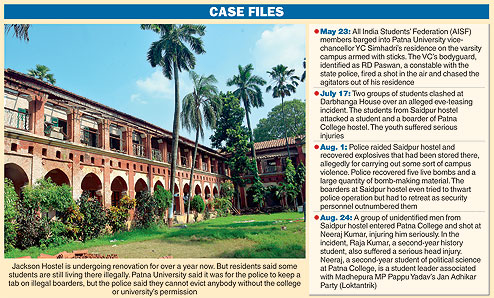
Mir Sahab lives in the Irani area of Forbesganj. A small town in Bihar on the border of Nepal and Bangladesh, Forbesganj has both an Irani and Iraqi area.
Mir Sahab's ancestors had a zamindari. A victim of the Land Ceiling Act, the property of his family was seized and now belongs to the aviation authority of India. He lives inside a small bamboo fence enclosure in a home made of mud, bamboo and bricks, near his fields.
He lives off the agricultural yield of his farms.
This area is in the Kosi belt, prone to constant floods. There is the additional isolation of being one of the few Muslims in a Hindu majority town and a Shia in a Sunni majority district - Araria.
When I meet him I ask him, why don't you sell your land and move to the city? Are you not upset at your shrinking lifestyle?
He refused categorically. "I am Indian and this is my land and home. In Bihar we are safe. We don't just coexist, we intermingle here."
"The taaziya procession my family leads to the Karbala needs to have the Hindu dhak players from Amhara bustee. I have to play Holi with people I know. The Hindu family of Forbesganj. My family built the Kali Mandir at the Karbala. We don't want to go anywhere, live in an apartment in a city, hiding our names just because we are Muslims. In Bihar we can be visible and secure. We are not second class citizens."

A young Muslim Kolhaiya boy sitting with us nodded vociferously. He was 10 when the Babri Masjid was demolished. "We were terrified. We heard people from our community were being burnt and killed with trishuls. When we saw a constable come to our Tolla, we did not know where to go. He told us that Lalu Prasad had asked SPs in all the districts to protect Muslims and Hindus," he said.
Lalu was born in Phulwaria, the second of six sons of Kundan Rai and Marachhiya Devi. He attended a local middle school before enrolling for an LLB and a masters in political science at BN College. After graduation, he got a job as clerk in Bihar Veterinary College, Patna, where his elder brother also worked as a peon. He turned down Patna University's honorary doctorate in 2004.
Often accused of causing a breakdown in law and order, he in fact protected Bihar from outbreaks of both religious and caste violence which the more prosperous states like Maharashtra and Gujarat were not able to prevent.
This culture of amity exists till this day, perhaps a reason for Lalu Prasad's party being re-elected.
I wondered if Hindus felt as protected in the Lalu-Nitish Kumar socialist government. I decided to go and meet the Hindu dhak players that Mir Sahab was talking about.
Bajta Ram - yes, that's the nickname of Liban Ram - welcomed us to the small courtyards between the mud huts in his small bustee. White plastic chairs were pulled out. A motorcycle headlight was switched on.
Ram said: "I feel special. I wait the whole year to walk the Muharram procession. We too mourn Hasan. We celebrate gods and goddesses but we celebrate human beings first in Bihar. The rhythm of the dhak, the dholak, the chamrua and the chandlok are of our common religion: Insaniyat."
Ruchira Gupta is a feminist campaigner, writer, visiting professor at New York University, adviser to the UN, and founder of Indian anti-sex trafficking organisation Apne Aap Worldwide.
Follow On Twitter @ruchiragupta and Facebook.com/ruchiraguptaJournalist










